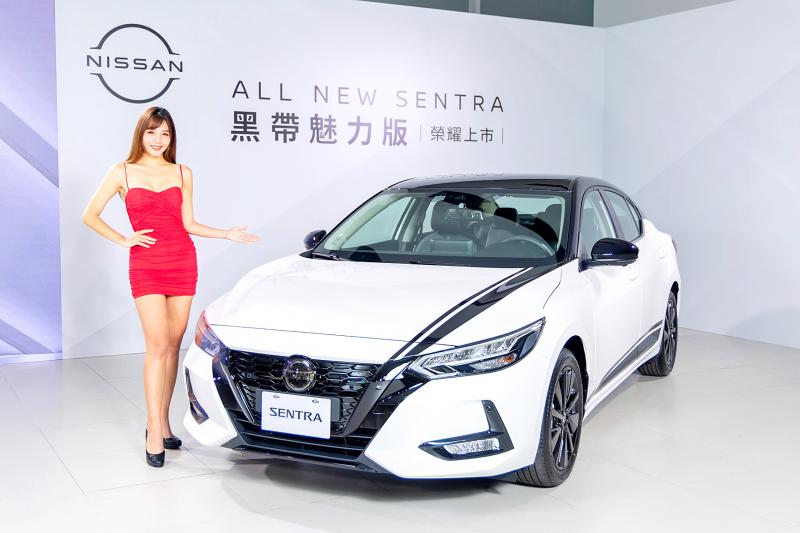Automaker Yulon Motor Co (裕隆) yesterday kept its forecast for domestic new vehicle sales this year at 436,000 units, saying that Shanghai’s reopening would boost production and component supplies.
The forecast is 0.5 percent higher than last year’s domestic sales of 434,000 units.
Sales in the first four months of the year plummeted 12.5 percent to 136,000 units from a year earlier, due to shortages of chips and key components, as well as logistic bottlenecks, Yulon vice president Lee Chien-hui (李建輝) said.

Photo: Amy Yang, Taipei Times
The 50-day lockdown in Shanghai has dealt a serious blow to global auto component supply chains, as the city is one of the world’s biggest manufacturing hubs of key components, Lee said.
Yulon is stepping up efforts to acquire more key components as production and logistics gradually return to normal, he said.
“We will closely monitor how consumers react to interest rate hikes, inflationary pressure and spike in COVID-19 infections. We will adjust [our forecast] accordingly,” Lee said.
Local automakers and distributors such as Hotai Motor Co (和泰) have accumulated sizeable order backlogs and people must wait at least a year for delivery.
Yulon reported that net profit in the first quarter surged 53 percent year-on-year to NT$2.07 billion (US$69.67 million) from NT$1.36 billion a year earlier, thanks to a substantial increase in investment gains. Investments rose 92 percent to NT$1.18 billion from NT$616 million a year earlier.
Gross margin improved to 34 percent from 29 percent a year earlier, company data showed.
Taiwan Acceptance Corp (裕融企業), an auto financing unit 45 percent owned by Yulon, helped boost Yulon’s performance, Lee said.
Revenue in the first quarter fell 7 percent to NT$19.04 billion from NT$20.27 billion a year earlier, due to a decline in vehicle sales at Yulon Nissan Motor Co Ltd (裕隆日產), which distributes Nissan Motor Co and Infiniti vehicles.
Yulon Nissan, which is 50 percent owned by Yulon, yesterday reported that net profit in the first quarter fell 0.1 percent to NT$808.5 million from NT$809.18 million a year earlier, while earnings per share were flat at NT$2.7.
Revenue fell 17 percent to NT$7.76 billion from NT$7.9 billion a year earlier due to a decline in new vehicle sales following shortages of key components.

Taiwan Semiconductor Manufacturing Co (TSMC, 台積電) would not produce its most advanced technologies in the US next year, Minister of Economic Affairs J.W. Kuo (郭智輝) said yesterday. Kuo made the comment during an appearance at the legislature, hours after the chipmaker announced that it would invest an additional US$100 billion to expand its manufacturing operations in the US. Asked by Taiwan People’s Party Legislator-at-large Chang Chi-kai (張啟楷) if TSMC would allow its most advanced technologies, the yet-to-be-released 2-nanometer and 1.6-nanometer processes, to go to the US in the near term, Kuo denied it. TSMC recently opened its first US factory, which produces 4-nanometer

PROTECTION: The investigation, which takes aim at exporters such as Canada, Germany and Brazil, came days after Trump unveiled tariff hikes on steel and aluminum products US President Donald Trump on Saturday ordered a probe into potential tariffs on lumber imports — a move threatening to stoke trade tensions — while also pushing for a domestic supply boost. Trump signed an executive order instructing US Secretary of Commerce Howard Lutnick to begin an investigation “to determine the effects on the national security of imports of timber, lumber and their derivative products.” The study might result in new tariffs being imposed, which would pile on top of existing levies. The investigation takes aim at exporters like Canada, Germany and Brazil, with White House officials earlier accusing these economies of

GREAT SUCCESS: Republican Senator Todd Young expressed surprise at Trump’s comments and said he expects the administration to keep the program running US lawmakers who helped secure billions of dollars in subsidies for domestic semiconductor manufacturing rejected US President Donald Trump’s call to revoke the 2022 CHIPS and Science Act, signaling that any repeal effort in the US Congress would fall short. US Senate Minority Leader Chuck Schumer, who negotiated the law, on Wednesday said that Trump’s demand would fail, while a top Republican proponent, US Senator Todd Young, expressed surprise at the president’s comments and said he expects the administration to keep the program running. The CHIPS Act is “essential for America leading the world in tech, leading the world in AI [artificial

REACTIONS: While most analysts were positive about TSMC’s investment, one said the US expansion could disrupt the company’s supply-demand balance Taiwan Semiconductor Manufacturing Co’s (TSMC, 台積電) new US$100 billion investment in the US would exert a positive effect on the chipmaker’s revenue in the medium term on the back of booming artificial intelligence (AI) chip demand from US chip designers, an International Data Corp (IDC) analyst said yesterday. “This is good for TSMC in terms of business expansion, as its major clients for advanced chips are US chip designers,” IDC senior semiconductor research manager Galen Zeng (曾冠瑋) said by telephone yesterday. “Besides, those US companies all consider supply chain resilience a business imperative,” Zeng said. That meant local supply would